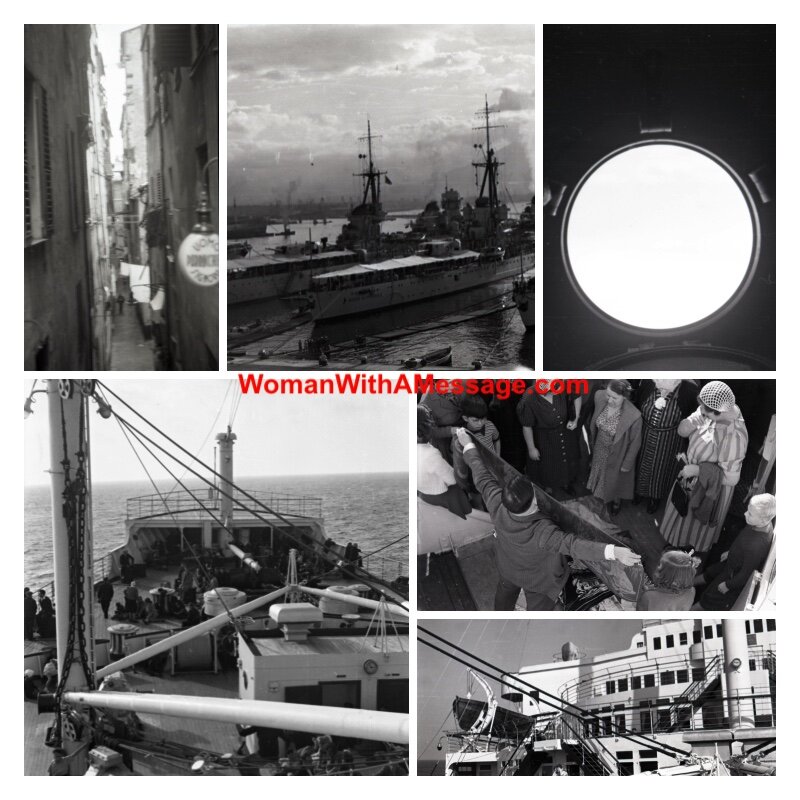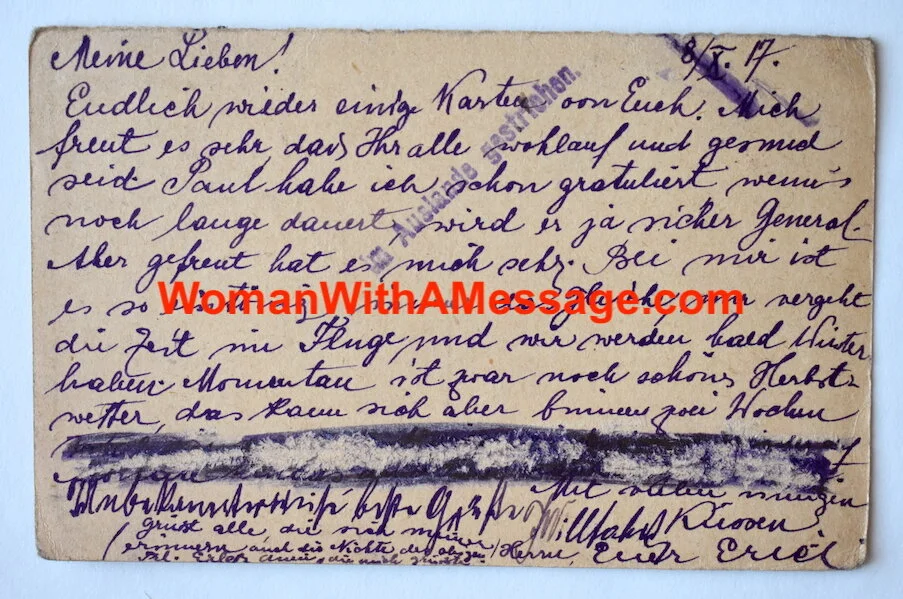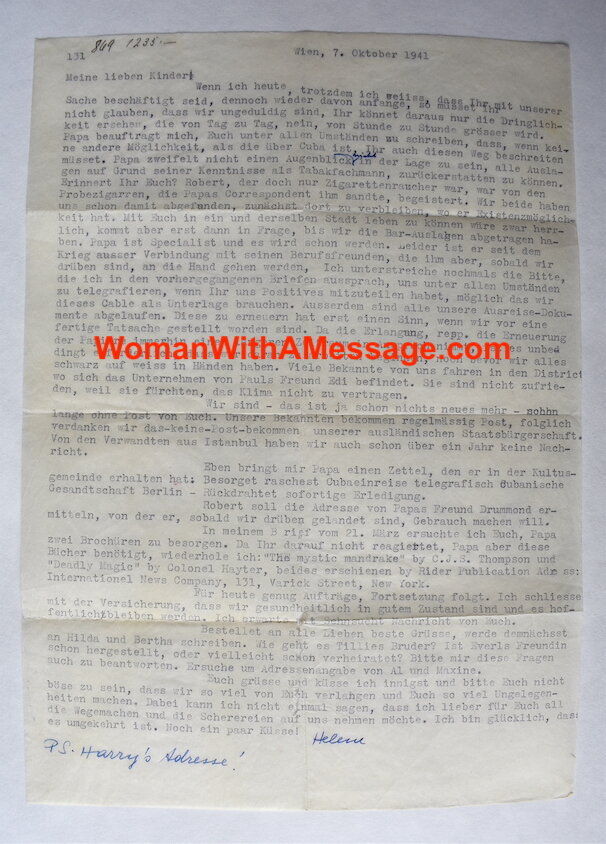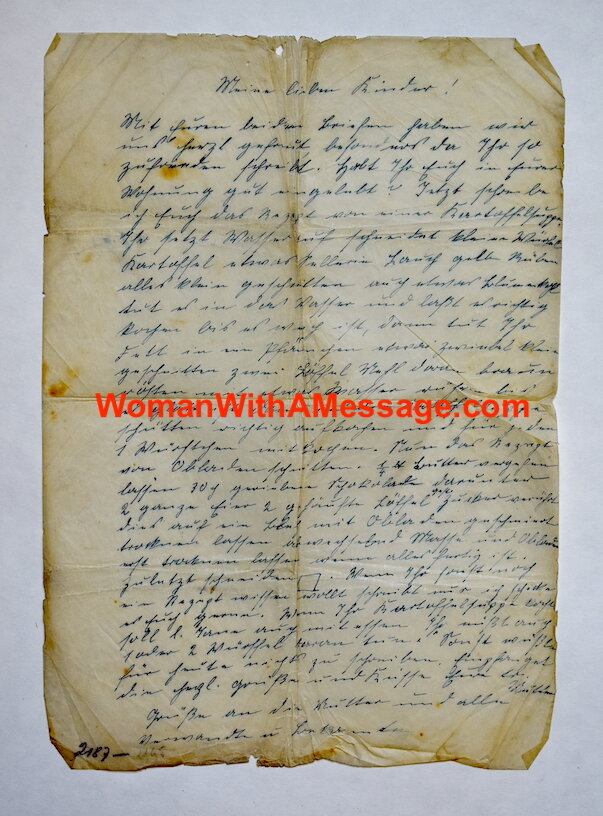Voyage to America – young and carefree
Link to Family Tree to understand family relationships.
I spent most of my life thinking that my 18-year old mother and her 15-year old brother were wrenched by the separation from their parents as took the train in Vienna to Genoa to board the ship headed for New York. After reading Helene’s letters, I realize that although being apart must have been a challenge, the entire family was confident in October 1939 that they would be reunited within a few months. They had no idea they would never see their father again and would not see their mother until 1946 after she had been through hell.
Thus, Eva and Harry could look forward to their voyage and future with enthusiasm and optimism. My mother always spoke fondly of the ocean voyage. For a brief period in her life, she was carefree – no responsibilities, no expectations, and the promise of America before her. Rather than being a foreigner in a new land and school, she was surrounded by others making the same voyage with the same hopes, who were not judging her accent, clothes, or manner. She loved every moment and as soon as she could afford it, she took cruises all over the world. I imagine none of them lived up to her first experience of traveling 3rd class on the “Rex”.
Growing up, my mother had a small album of photos from Europe, which included these 2 photos of her on board the ship:
On back of the photo with Eva in a bathing suit, with the date 10/10/1939:
When I was going through Harry’s boxes of documents and letters after he died in 2017, I found a roll of negatives labeled 1939. I held them up to the light and only one photo seemed familiar – the one with Eva on deck with a scarf. Since the photo of her in the bathing suit is not on the roll, I assume that Luis Antonio Martinez sent her that photo.
I realized that the roll of film included images from their voyage and first moments in San Francisco and got the negatives digitized. Imagine my delight at seeing their voyage and new world through Eva and Harry’s eyes.
Harry documented much of the trip, presumably in order to send photos back to their parents in Vienna, which I imagine is why we had no hard copies of the photos. Below, we see a grainy photo of an Italian town, presumably Genoa. From the ship, we see a vendor selling rugs to a crowd of people below, other ships in the harbor, the deck of the Rex, and even the “view” from their porthole.
Here is a photo of Harry on board the ship:
Harry saved a menu from the ship – I don’t know whether they had menus for each meal, or just for October 12 in honor of Columbus Day – which must have been quite the celebration since the ship departed from Genoa, the birthplace of Christopher Columbus. Apparently even the 3rd class passengers were invited to participate in the dancing or watching the featured film La Mia Canzone al Vento of the evening which featured Giuseppe Lugo, a famous Italian tenor. Harry used the menu as a sort of autograph book – someone wrote a nice note and a few people included their addresses.
Harry kept in touch with at least one of the people, Elsy Howard, who sent him a card the following year from the New York World’s Fair, on which she wrote around the edges: "Many thanks for letter, which I will answer later. Hope you like Amerika now. Best regards, also to Maria, Elsy Howald."
After nine fun-filled days at sea, Eva and Harry arrived in New York. In one of my first forays into searching through Ancestry at the public library in 2017, I found the ship’s manifest page of arriving passengers on the Rex that showed Eva Marie Kohen and Harry Kohen’s departure from Genoa on October 6 and arrival in New York on October 15, 1939. They are listed as students, Turkish citizens who could speak English , born in Vienna, Germany (Austria had been annexed), planning to live permanently in the US. They had visas issues July 31, 1939 from their last permanent residence of Istambul, Turkey. Amazing what you can learn from a line from a ship’s manifest!
In August, I attended a Jewish genealogy conference, and at one session the speaker mentioned that manifests covered two-pages. I went back to Ancestry and found page 2:
We learn that their father was named Simeon (presumably a mishearing of Haim Seneor) who lived in Vienna, Germany; that their final destination was San Francisco; that they paid their own way; that they had $8 in their possession provided by HIAS; that they were planning to reside at 200 Washington St. in San Francisco (I’m not sure whose address that was); that they did not plan to return to their home country and intended to become U.S. citizens; that they were never in prison, were not polygamists, anarchists, did not believe in overthrowing the government; they did not have a promise of employment; had never been arrested and deported; that they were in good mental and physical health and had no deformities; their height, complexion, hair and eye color, and had no other identification marks.
A new piece of information was that they had received $8 from HIAS – worth over $150 in today’s dollars, – although probably not enough money for the journey from New York to San Francisco.
I spent most of my life having a vague idea of Eva’s and Harry’s voyage. I had only seen the first two photos above. After discovering Harry’s trove of saved objects and photos and doing some research, I now feel like I have a sense of what it was like. A wonderful window onto the beginning of their new life.









































